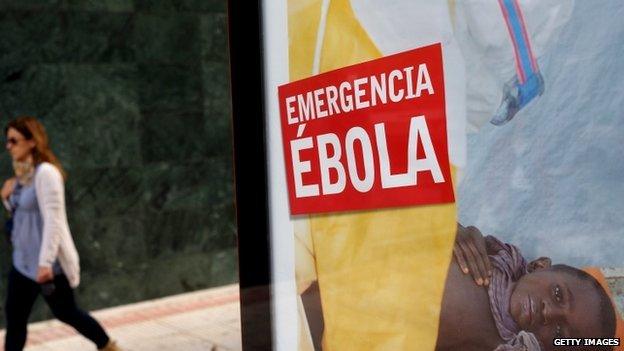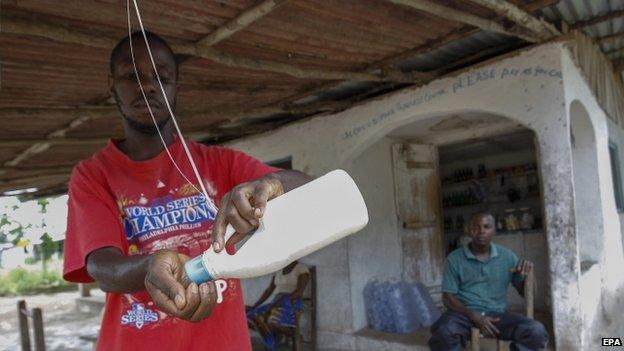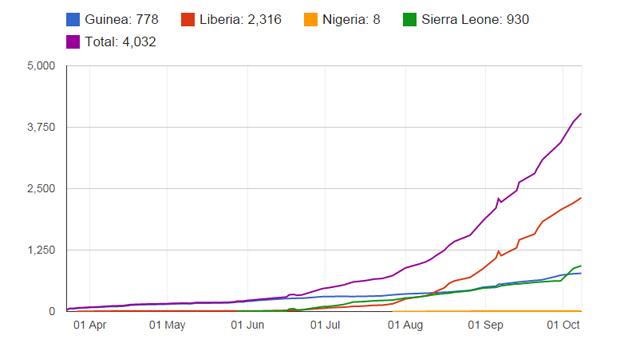Global Ebola outbreak deaths exceed 4,000 - WHO
- Published
A group of volunteers in Freetown, Sierra Leone, is on a mission to end the Ebola outbreak - Tulip Mazumdar reports
The number of deaths attributed to the Ebola outbreak has risen above 4,000, the World Health Organization says.
The latest figures show, external there have been 4,024 confirmed or suspected deaths in the worst-affected West African nations of Guinea, Liberia and Sierra Leone.
Eight deaths are linked to the haemorrhagic fever in Nigeria and one in the US.
In total, there have been 8,399 confirmed or suspected cases, mostly in West Africa.
Spain's 'crisis' committee
The news comes as Liberian lawmakers refused to grant the president additional powers to deal with the Ebola crisis.

Warning messages about Ebola have appeared in public places in Spain

Ebola is taking a particularly heavy toll in Liberia
President Ellen Johnson Sirleaf has already declared a state of emergency that allows her to impose quarantines.
One parliamentarian, Bhofal Chambers, warned that creeping extra powers could turn Liberia into a "police state".
The UN says more than 233 health workers working in West Africa have now died in the outbreak, the world's deadliest to date.
A nurse in Spain is being treated for the virus after becoming infected from an Ebola patient who had been repatriated from Liberia - the country most badly hit by the disease with 2,316 confirmed or suspected deaths.

Ebola deaths: Confirmed, probable and suspected

Source: WHO
Note: figures have occasionally been revised down as suspected or probable cases are found to be unrelated to Ebola. They do not include one death in the US recorded on 8 October.

Teresa Romero is said to be gravely ill but stable, and is being treated in a hospital in Madrid.
Spanish Prime Minister Mariano Rajoy on Friday set up a special committee to deal with the impact of Europe's first case of Ebola.
He admitted that the situation was "complex and difficult", but stressed that the government had a clear plan for what needed to be done.
He was speaking as seven more people in Spain were being monitored in hospital for suspected Ebola. They include two hairdressers who came into contact with Ms Romero.
Experimental serum
Meanwhile, a senior health official told the BBC that leading global experts in the field had not anticipated the scale of the Ebola outbreak.
WHO's Dr Chris Dye: We didn't anticipate this outbreak was going to be this big
Chris Dye from the WHO said the international response was helping, and the important thing now was to look forward.
"We've asked for a response of about $1bn (£618m); so far we have around $300m (£185m) with more being pledged, so a bit less than half of what we need but it's climbing quickly all the time," he said.
In April, the medical charity Medecins Sans Frontieres (MSF) warned of the potential spread of the virus, but at the time the WHO played down the claims, saying that Ebola was neither an epidemic, nor was it unprecedented.
On Friday MSF reported a sharp increase of Ebola cases in the Guinean capital,, external Conakry, dashing hopes that the disease was being stabilised there.
Meanwhile in Mali, an experimental serum is being tested on volunteer health workers.
The trial spans several countries, and the results will be sent to experts to determine whether it can protect against Ebola.
In other developments:
The Ebola crisis has resulted in the activation for the first time of the International Charter on Space and Major Disasters. Its normal role is to provide satellite imagery to make damage and hazard-assessment maps
Liberia's senate elections due next week have been postponed to help reduce the risk of voters spreading the virus
Nigeria's military has confirmed that more than 1,300 Nigerian peacekeeping troops have been quarantined in Liberia after coming into contact with a Sudanese man who later died of the disease. It had earlier denied such reports
Passengers at some British airports will be screened for Ebola
The US begins its programme of enhanced screening this weekend at five of its major airports, including JFK

Avoid direct contact with sick patients
Wear goggles to protect eyes
Clothing and clinical waste should be incinerated and any medical equipment that needs to be kept should be decontaminated
People who recover from Ebola should abstain from sex or use condoms for three months


-
Protective Ebola suit
× -
Surgical cap
×The cap forms part of a protective hood covering the head and neck. It offers medical workers an added layer of protection, ensuring that they cannot touch any part of their face whilst in the treatment centre.
-
Goggles
×Goggles, or eye visors, are used to provide cover to the eyes, protecting them from splashes. The goggles are sprayed with an anti-fogging solution before being worn. On October 21, the US Centers for Disease Control and Prevention (CDC) announced stringent new guidelines for healthcare personnel who may be dealing with Ebola patients. In the new guidelines, health workers are advised to use a single use disposable full face shield as goggles may not provide complete skin coverage.
-
Medical mask
×Covers the mouth to protect from sprays of blood or body fluids from patients. When wearing a respirator, the medical worker must tear this outer mask to allow the respirator through.
-
Respirator
×A respirator is worn to protect the wearer from a patient's coughs. According to guidelines from the medical charity Medecins Sans Frontieres (MSF), the respirator should be put on second, right after donning the overalls.
-
Medical Scrubs
×A surgical scrub suit, durable hospital clothing that absorbs liquid and is easily cleaned, is worn as a baselayer underneath the overalls. It is normally tucked into rubber boots to ensure no skin is exposed.
-
Overalls
×The overalls are placed on top of the scrubs. These suits are similar to hazardous material (hazmat) suits worn in toxic environments. The team member supervising the process should check that the equipment is not damaged.
-
Double gloves
×A minimum two sets of gloves are required, covering the suit cuff. When putting on the gloves, care must be taken to ensure that no skin is exposed and that they are worn in such a way that any fluid on the sleeve will run off the suit and glove. Medical workers must change gloves between patients, performing thorough hand hygiene before donning a new pair. Heavy duty gloves are used whenever workers need to handle infectious waste.
-
Apron
×A waterproof apron is placed on top of the overalls as a final layer of protective clothing.
-
Boots
×Ebola health workers typically wear rubber boots, with the scrubs tucked into the footwear. If boots are unavailable, workers must wear closed, puncture and fluid-resistant shoes.